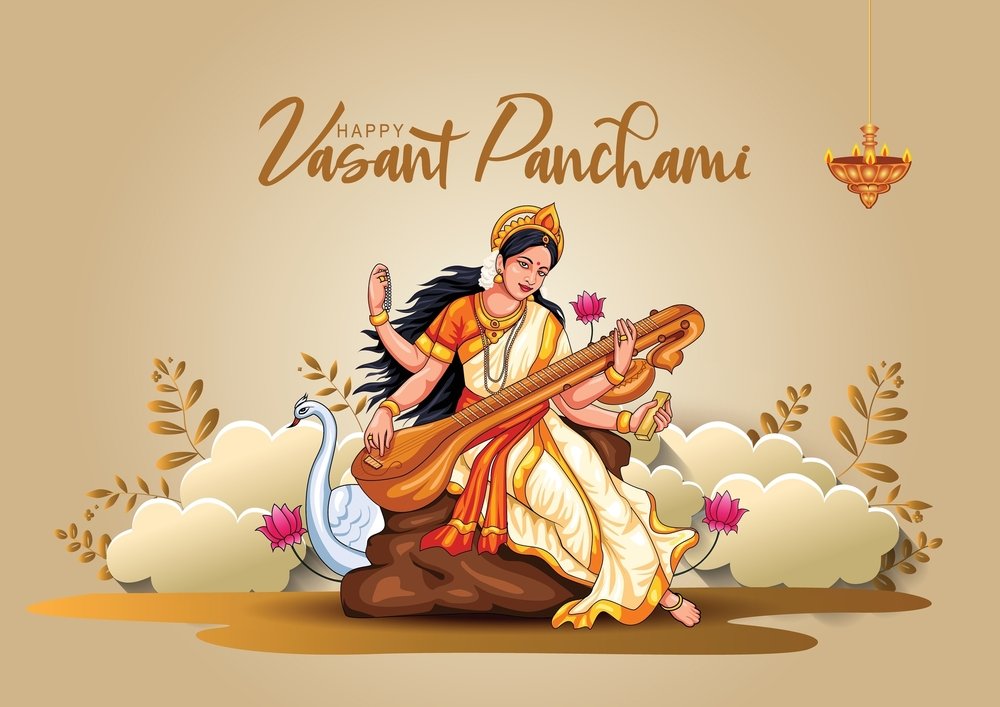Vasant Panchami is one of the most vibrant and meaningful festivals celebrated in India. It marks the arrival of spring, a season associated with renewal, beauty, and prosperity. The festival, also known as Basant Panchami, is celebrated with much enthusiasm across India and Nepal. Vasant Panchami is especially significant in Hindu tradition, where it is associated with the worship of Saraswati, the goddess of knowledge, music, arts, and wisdom.
What is Vasant Panchami?
Vasant Panchami is a Hindu festival that marks the beginning of the spring season in India. The word “Vasant” means spring, and “Panchami” refers to the fifth day of the lunar month. Vasant Panchami falls on the fifth day of the bright half (Shukla Paksha) of the Magha month in the Hindu calendar, which typically falls in late January or early February.
Vasant Panchami is significant in multiple ways. It celebrates the transition from the harsh, cold winter to the pleasant, warm spring. In addition, the festival is a day dedicated to Goddess Saraswati, the embodiment of wisdom, learning, and creativity.
Why is Vasant Panchami Celebrated?
Vasant Panchami holds immense significance for several reasons:
Celebration of Spring (Vasant)
- The arrival of spring is one of the primary reasons for the celebration of Vasant Panchami. Spring is a season associated with new beginnings, renewal of life, and flourishing of nature. The chill of winter begins to recede, and the earth becomes vibrant with blooming flowers and greenery. The festival symbolizes the rejuvenation of nature and the prosperity that spring brings. People celebrate the beauty of this season by dressing in yellow, which is symbolic of the color of mustard flowers that bloom in this time.
Worship of Goddess Saraswati
- Vasant Panchami is primarily dedicated to Goddess Saraswati, the Hindu goddess of knowledge, wisdom, music, and arts. She is believed to be the source of all knowledge and intellect. On this day, devotees pray to her for wisdom and enlightenment, especially students and artists. Many students keep their books, musical instruments, and learning tools near her idol or picture and offer prayers, seeking blessings for success in their academic or artistic endeavors.
Rituals for New Beginnings
- Vasant Panchami is also seen as a day to begin new ventures or initiate new projects. People believe that starting new activities or business ventures on this day is auspicious. As the festival signifies the start of the spring season, it marks a time of change, growth, and opportunities, making it an ideal time for fresh starts.
Harvest Festival in Some Regions
- In some parts of India, Vasant Panchami also marks the beginning of the harvest season, particularly for the mustard crop. The festival is often associated with the harvest of mustard, which is a significant crop in many parts of India. This connection makes it a time to thank nature for its bounties and seek blessings for an abundant harvest.
Why Do We Celebrate Vasant Panchami?
The reasons for celebrating Vasant Panchami are deeply rooted in cultural, spiritual, and seasonal traditions. Here are the primary reasons behind the festival’s celebration:
Honoring Goddess Saraswati
- Goddess Saraswati holds a central place in Vasant Panchami. The festival is dedicated to her as a way to honor her contributions to knowledge, creativity, and learning. As a symbol of wisdom, Saraswati is worshipped by students, scholars, musicians, and artists. The day is considered particularly auspicious for starting studies, learning new skills, or pursuing any form of artistic or intellectual growth.
Welcoming the Spring Season
- Vasant Panchami signifies the arrival of spring, a season of renewal, vibrancy, and growth. After the cold winter months, the earth starts to warm up, and flowers like mustard, marigold, and jasmine begin to bloom. The festival celebrates the rejuvenation of nature, marking a time when everything comes to life again after the dormancy of winter.
Spreading Knowledge and Learning
- As a day dedicated to Goddess Saraswati, Vasant Panchami emphasizes the importance of learning and knowledge. Schools and colleges often celebrate this day by organizing events, prayers, and rituals. Students also place their books and educational tools near the goddess’s idol or picture and seek blessings for success in their studies. The idea is to nurture intellectual growth and encourage creativity.
Spiritual Significance
- The spiritual importance of Vasant Panchami also lies in its association with the arrival of wisdom and the dispelling of ignorance. People believe that by worshipping Goddess Saraswati and offering prayers to her, they can gain knowledge, wisdom, and enlightenment. In a broader sense, it symbolizes the triumph of good over ignorance.
Cultural Celebration
- Vasant Panchami is also a cultural celebration where people come together to enjoy music, dance, and other creative forms of expression. In various regions of India, the festival is marked by the holding of cultural programs, fairs, and feasts. Traditional dances, music performances, and kite flying are common festivities, creating an atmosphere of joy and celebration.
Rituals and Celebrations on Vasant Panchami
Vasant Panchami is celebrated with a blend of religious rituals, festive activities, and cultural events. The key rituals and celebrations include:
Worship of Goddess Saraswati:
- People place idols or pictures of Goddess Saraswati in their homes or temples and offer prayers. Devotees often chant Saraswati Vandana and seek her blessings for wisdom and success. Students keep their books, pens, and musical instruments near the goddess and worship them. It is believed that this act helps in enhancing intellectual abilities.
Dress Code and Color:
- On Vasant Panchami, people traditionally wear yellow-colored clothes. Yellow is considered an auspicious color associated with the mustard flowers that bloom during this season. The color also symbolizes prosperity, happiness, and fertility.
Kite Flying:
- In parts of India, particularly in Gujarat and Madhya Pradesh, kite flying is a popular activity on Vasant Panchami. The skies fill with colorful kites as people gather in open spaces to enjoy the vibrant day. This is not only a fun activity but also symbolizes the spirit of freedom and joy.
Feasts and Sweets:
- Vasant Panchami is also a time for enjoying traditional sweets. Tilgul (sesame and jaggery) and other sweets made from grains are commonly distributed, as they symbolize sweetness and good health. Special dishes like khichdi are prepared in some parts of the country.
Community Celebrations:
- In rural areas, the festival is celebrated with much fanfare. People come together to organize local fairs, dances, and musical performances. The entire community celebrates the arrival of the spring season with songs and dances that praise nature and the harvest.

